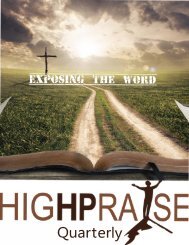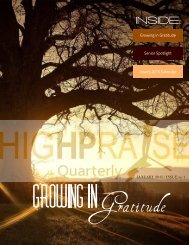Create successful ePaper yourself
Turn your PDF publications into a flip-book with our unique Google optimized e-Paper software.
This “ordinary” Magisterium involves, among other things, bishops in various places<br />
beginning to teach the same particular doctrine (for instance, the teaching that Mary was<br />
conceived without sin), and that if this teaching gains acceptance throughout the church as a<br />
whole, it is an indication that the Holy Spirit is working through the bishops and that this<br />
teaching is from God. The pope may later recognize this and proclaim infallibly that it comes<br />
from God and is to be accepted by all Roman Catholics.<br />
Discussion<br />
How might Matthew 23: 2-3 appear to support the decision of the First Vatican<br />
council?<br />
In which area(s) did First Vatican Council stray away from the Bible?<br />
How did this decision affect those of the Catholic <strong>Church</strong>?<br />
Putting The Pope To The Test<br />
The Roman Catholic <strong>Church</strong> sees the papacy and the infallible teaching authority of “mother<br />
<strong>Church</strong>” as being necessary to guide the <strong>Church</strong>, and uses that as logical reasoning for<br />
God’s provision of it. But in examining Scripture, we find the following:<br />
1. While Peter was central in the early spread of the gospel (part of the meaning behind<br />
Matthew 16:18-19), the teaching of Scripture, taken in context, nowhere declares that<br />
he was in authority over the other apostles or over the entire church (see Acts 15:1-23;<br />
Galatians 2:1-14; 1 Peter 5:1-5). Nor is it ever taught that the bishop of Rome was to<br />
have primacy over the church.<br />
2. Nowhere does Scripture state that, in order to keep the church from error, the authority<br />
of the apostles was passed on to those they ordained (the Roman Catholic <strong>Church</strong><br />
teaching of "apostolic succession"). Apostolic succession is “read into” those verses<br />
that the Roman Catholic <strong>Church</strong> uses to support this doctrine (2 Timothy 2:2; 4:2-5;<br />
Titus 1:5; 2:1; 2:15; 1 Timothy 5:19-22).<br />
Summary<br />
In summary, the Bible speaks of only one abiding, "tangible," infallible guide left by God for<br />
His church. It is the written word of God, not an infallible leader (2 Timothy 3:15-17). And, as<br />
He gave the Holy Spirit to bear holy men along in the writing of those Scriptures (2 Peter<br />
1:19-21), so He has given His Holy Spirit to indwell, fill, guide, and gift members of His church<br />
today for the purpose of directing His church through the proper interpretation of that written<br />
word (1 Corinthians 12 and 14; Ephesians 4:11-16).<br />
The fact that there are schisms and false teachings today should be no surprise, since the<br />
Bible also warns us that there would be false teachers who would twist the written word (2<br />
Peter 3:16) and that these false teachers would arise from within the churches (Acts 20:30).<br />
Therefore, the believers were to turn to God and the "word of His grace" for their guidance<br />
(Acts 20:32), determining the truth not by who said it, but by comparing it with the gospel

















